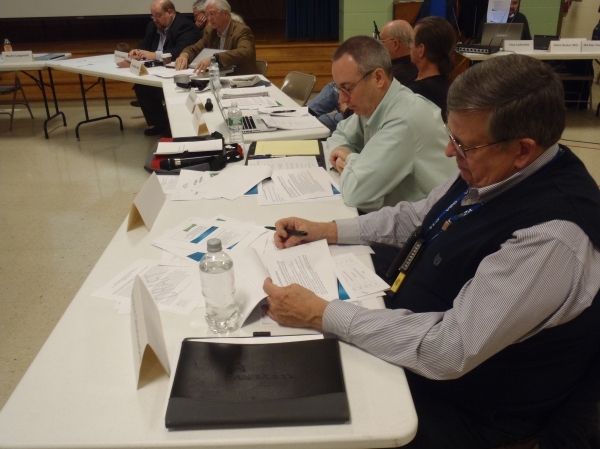BRATTLEBORO — At the first meeting of the Vermont Nuclear Decommissioning Citizens Advisory Panel (VNDCAP) in 2014, there was lots of talk about the need for openness and transparency.
Lately, though, a dispute has arisen about how far the panel has to go to meet those goals. Some members have proposed limiting press and public use of a call-in feature for those who cannot attend meetings in person.
Panel Chairwoman Kate O'Connor is pushing back against such changes. After an April 12 meeting of a newly formed Public Access Subcommittee, O'Connor said she wants the full advisory panel to consider language mandating that all “reasonable accommodations” be made to allow for remote access to future VNDCAP meetings.
“We don't want to take any action to limit anyone, because we are a public body formed by the Legislature,” O'Connor said.
Vermont Yankee ceased producing power at the end of 2014, and the 19-member citizens advisory panel has been meeting regularly to discuss decommissioning issues. Its duties include advising the Legislature, the governor and state agencies; the panel also is charged with serving as “a conduit for public information and education on (decommissioning) and to encourage community involvement.”
It is common for some members of the advisory panel to call into meetings when they can't make it to Windham County. But the current debate began when O'Connor allowed a Rutland Herald reporter to listen in via phone to the panel's February meeting, and Entergy representatives subsequently objected.
A month later, at the panel's March 24 meeting, O'Connor said she was surprised by the company's concern. “It didn't occur to me that it would be a problem to have a reporter on the phone,” she said at the time. “I see this as a public panel. Our goal is to get our information out to the public. One of those avenues is through the news media.”
Paul Paradis, Vermont Yankee's decommissioning director, responded by saying he wasn't objecting to open meetings. Rather, Paradis said he was worried about the quality of journalism gleaned from a conference call.
“My concern was, what you hear on the phone versus what you hear face-to-face,” Paradis told fellow panel members in March. “Sometimes, it's two different things. And the accuracy of the reporting could be compromised.”
The March discussion picked up steam from there. A diverse roster of panel members - including state Commerce and Community Development Secretary Pat Moulton, Vernon representative Steve Skibniowski, and governor's appointee Martin Langeveld said they'd like to limit use of call-ins to panel members only, or to those who might be testifying before the panel.
David Andrews, a VNDCAP member who represents present and former employees of Vermont Yankee, wondered whether the phone system would be adequate if many members of the public wanted to call in at once. “It's a very slippery slope, and I think we've already started to go down it,” Andrews said.
Andrews was among those who also noted that Brattleboro Community Television posts video of panel meetings a few days after the sessions. The question of allowing remote access to reporters or the public “seems almost like a non-issue to me,” he said at the March meeting.
At the urging of Windham Regional Commission Executive Director Chris Campany, a Public Access Subcommittee was formed to come up with a solution. Just two subcommittee members - O'Connor and Jim Tonkovich - showed up for the April 12 meeting in Brattleboro, but they endorsed new, more inclusive public-access language submitted by Campany, another member.
The proposed, two-sentence policy reiterates the advisory panel's mission and says VNDCAP “will make reasonable accommodations to facilitate access to panel meetings by those who are unable to attend in person.” Those accommodations “may include live streaming of meeting audio via the internet, access by conference phone or similar means.”
O'Connor said she hopes the full advisory panel adopts the language at its next scheduled meeting in May. “If we can settle it now, and put it in the charter, we won't be having these discussions at every meeting,” she said.
Limiting public access, O'Connor added, “goes against everything that the committee is supposed to be about.”
O'Connor talked with state Nuclear Engineer Tony Leshinskie, who serves as a technical adviser at VNDCAP meetings, about ways to beef up the advisory panel's audio and visual equipment to accommodate any increased demand for remote access.
The subcommittee also produced state records showing that February wasn't the first time a reporter was allowed to join an advisory panel meeting remotely. In January, a radiological waste reporter from Washington, D.C., listened in.
Those records show that a few state officials who aren't panel members also have called in to meetings, as have others not affiliated with state government.
A question about media access “is how this whole thing started,” O'Connor said. “But it's a broader issue. The public is the bigger issue.”
Asked about the proposed public access language, Vermont Yankee spokesman Marty Cohn said the company likely won't object if remote meeting access is advertised and made available both to the press and to the public.
“We welcome public participation and believe that, as long as everyone has access, that's fair,” Cohn said.
